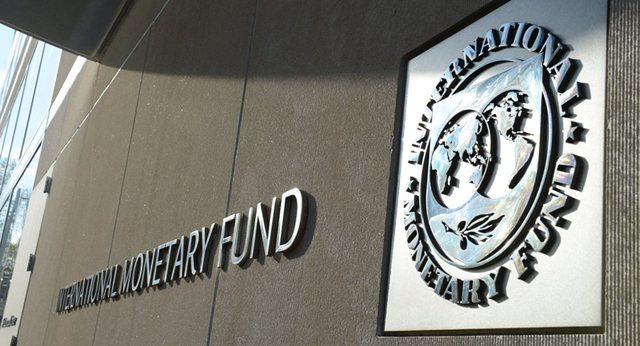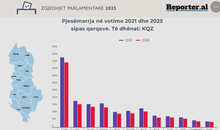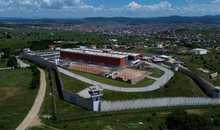
 Flash News
Flash News
Shuhet në moshën 86-vjeçare regjisori i njohur Piro Milkani
Poisoning of children in Gramsh, health authorities react after the publication of the case
SPAK conducts inspections at Tirana Municipality, 5 phones seized
4 days after the intervention at a dental clinic in Tirana, a 63-year-old Italian man dies in hospital
Igli Tare officially appointed as Milan's new Sporting Director
The IMF lowers the expectation for Albania's economic growth in 2022, it is estimated to be the lowest in the region

The International Monetary Fund (IMF), in light of new developments following Russia's attacks on Ukraine, has significantly reduced Albania's economic growth expectations by more than halving.
In the April report of the "Global Economic Outlook", recently published, the IMF predicts that the Albanian economy will grow this year by only 2%, from 4.5% that was forecast in October. This slowdown comes as in 2021, the domestic economy grew by 8.5%, after falling by 3.5% in 2020, when the economy suffered the consequences of the pandemic. Growth rates are expected to be low in 2023, with 2.8% and will accelerate slightly to 3.4% by 2027.
Our country is estimated to have the lowest growth in the region. For Montenegro the rating is 3.8, for Bosnia and Herzegovina 2.4%, for Kosovo 2.8%. Northern Macedonia is expected to grow by 3.2%. Serbia is less expected to feel the war, which is estimated to expand by 3.5% this year and accelerate to 4% in the coming years.
All international institutions have revised downwards in recent weeks expectations for the country's economic growth, due to the effects that Russia's war on Ukraine is having on the global economy. But the IMF is by far the most pessimistic. The lowering of the IMF forecast is related to the war and its impact on the country's key partners (such as Italy) as well as the energy situation.
According to the European Bank for Reconstruction and Development (EBRD), Albania's economy is expected to expand by 3.3% in 2022, decreasing by 0.4 percentage points, compared to the November projection.
The World Bank in its latest report "War in the Region" for Central Europe and Asia now expects the domestic economy to grow by 3.2 percent, or 0.6 percentage points less than the previous report. Even for 2023, the economy is expected to grow by 3.4%, or 0.3 percentage points less than the previous estimate.
Expectations for global growth are declining
According to the IMF's April Global Economic Outlook, entitled "War Stops Economic Recovery," global economic outlook has deteriorated significantly since the last forecast in January. At the time, the IMF predicted that the global recovery would be strengthened by the second quarter of this year following a short-lived impact of the Omicron variant. Since then, the outlook has deteriorated, largely due to the Russian occupation of Ukraine - sparking a tragic humanitarian crisis in Eastern Europe - and sanctions aimed at putting pressure on Russia to end the conflict.
Përtej ndikimeve të menjëhershme humanitare, lufta do të frenojë rëndë rimëkëmbjen globale, duke ngadalësuar rritjen dhe duke rritur inflacionin edhe më tej. Raporti parashikon që rritja globale të jetë në 3.6 për qind në 2022 dhe 2023, përkatësisht 0.8 dhe 0.2 pikë përqindjeje më e ulët se në parashikimin e janarit. Ulja e vlerësimit reflekton kryesisht ndikimet e drejtpërdrejta të luftës në Rusi dhe Ukrainë dhe efektet globale të saj.
Si Rusia ashtu edhe Ukraina parashikohet të përjetojnë tkurrje të mëdha të PBB-së në vitin 2022. Kolapsi i rëndë në Ukrainë është rezultat i drejtpërdrejtë i pushtimit, shkatërrimit të infrastrukturës dhe eksodit të njerëzve të saj.
Në Rusi, rënia e mprehtë reflekton ndikimin e sanksioneve me ndërprerjen e lidhjeve tregtare, dëmtim të madh të ndërmjetësimit financiar të brendshëm dhe humbjen e besimit.
Ukraine is expected to have an economic decline of -35% and Russia of -8.5%.
The report notes that the economic effects of the war are spreading widely - such as seismic waves emanating from the epicenter of an earthquake - mainly through commodity markets, trade and financial ties. Because Russia is a major supplier of oil, gas and metals, and, along with Ukraine, wheat and corn, the current and expected drop in supply of these goods has already significantly increased their prices.
Europe, the Caucasus and Central Asia, the Middle East and North Africa, and Sub-Saharan Africa are most affected. Rising food and fuel prices will hurt lower-income households globally, including in South America and Asia./Monitor
Latest news


Kujdes nga mashtrimet online, si teknologjia nxit krimet financiare
2025-05-24 21:32:33

Opposition's denunciations, Xhaferri: We expect the US to listen to us
2025-05-24 20:48:06
How did PSD "capture" over 50% of the votes in rural areas?
2025-05-24 20:29:54
The Albanian woman with the s*x went to meet her husband in Koridalos prison
2025-05-24 20:09:15
Ancelotti says goodbye to Real Madrid in tears: I love you with all my heart!
2025-05-24 19:49:08
Poisoning in Gramsh, parents of children warn of protest
2025-05-24 19:21:36
Taulant Xhaka retires from football
2025-05-24 18:53:35


Incident in the north, Serbia issues arrest warrant for Kosovo police officer
2025-05-24 17:59:24

SPAK conducts inspections at Tirana Municipality, 5 phones seized
2025-05-24 17:19:23
FIFA President congratulates Egnatia on the championship title
2025-05-24 17:00:15


Boçi: The elections were annulled, the DP will continue the fight
2025-05-24 16:06:58
Man reports to police: Wife took my son and ran away, I'm asking for help
2025-05-24 15:45:55
France and Germany with a "non-paper" for Republika Srpska
2025-05-24 15:29:29

Beware of online scams! Here's how technology fuels financial crimes in Albania
2025-05-24 14:53:33

The US military "landed" in Kosovo as part of "Defender Europe 25"
2025-05-24 14:42:19










BIRN Analysis: Voters who were absent in the parliamentary elections
2025-05-24 11:19:40




Bus collides with municipal police car in Fier, 6 injured
2025-05-24 09:25:01
Foreign exchange, May 24, 2025
2025-05-24 09:07:27

With rain and storms, get to know the weather forecast
2025-05-24 08:32:03
What do the stars have in store for you today?
2025-05-24 08:17:04
Morning Post/ In 2 lines: What mattered yesterday in Albania
2025-05-24 08:00:34




Tirana Lake Park, a campaign center for Noizy. The signatory is silent
2025-05-23 21:55:02



What's happening in Gaza, the struggle for survival in times of war in pictures
2025-05-23 21:02:54
DW: Germany strengthens the return of illegal migrants!
2025-05-23 20:39:57


Knife attack at Hamburg train station, 12 injured
2025-05-23 19:54:58
120 children go missing every year in Albania, 12 still missing in 30 years
2025-05-23 19:35:35
US court suspends order banning Harvard from admitting foreign students
2025-05-23 19:22:41
Zodiac signs that become luckiest after the third decade of life
2025-05-23 19:19:06
Igli Tare officially appointed as Milan's new Sporting Director
2025-05-23 19:01:12




Istanbul Agreement, Ukraine and Russia exchange 800 prisoners
2025-05-23 17:54:20



Belina Pupa reacts to serious accusations in Australia for drug cultivation
2025-05-23 16:59:55


The Llogara tunnel opens tomorrow, until when will it be free of charge?
2025-05-23 16:09:31






The first prisoners from Denmark are expected to arrive in Kosovo in April 2027.
2025-05-23 14:51:26
May 11/ Celibashi approves the summary tables of results for 4 districts
2025-05-23 14:50:04
Trump threatens tariffs on EU goods and iPhones
2025-05-23 14:39:47
Artan Lame passes away, his mother confirms: This cursed moment came
2025-05-23 14:26:48
Divorce map in 61 municipalities, the South far ahead of the North
2025-05-23 14:15:16
2-year-old Dutch boy falls from third floor of Rinas hotel, taken to hospital
2025-05-23 14:01:40
Europeans, you have slandered us.
2025-05-23 13:54:00
Vlora/ He hit the minor and fled the scene, the 27-year-old woman is wanted
2025-05-23 13:41:24
Arrested today in Lalëz, who is Flobens Meçja, was paid by Çopja to kill Alibej
2025-05-23 13:33:43
Here's how many hours you should sleep depending on your age
2025-05-23 13:32:16
Berisha reveals when he will leave politics
2025-05-23 13:12:15
Three proven ways to dismantle an autocrat
2025-05-23 13:03:16
"The goods are 800-cents", how Altin Morina trained RENEA and made bargains
2025-05-23 12:59:07
Berisha: Poja was Rama's guest, Surreli was used for gang meetings
2025-05-23 12:49:22



Meta: The criminal regime destroyed the elections, a threat to democracy
2025-05-23 12:16:48

